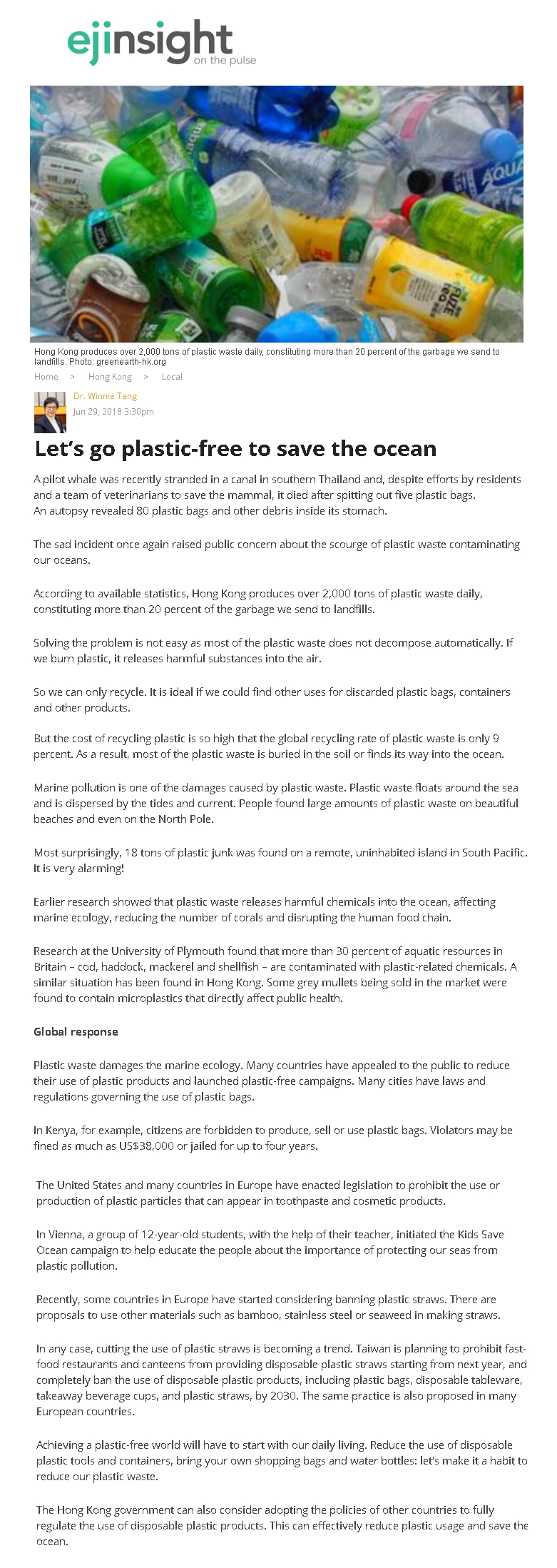網上版請按此

Let's go plastic-free to save the ocean
A pilot whale was recently stranded in a canal in southern Thailand and, despite efforts by residents and a team of veterinarians to save the mammal, it died after spitting out five plastic bags. An autopsy revealed 80 plastic bags and other debris inside its stomach.
The sad incident once again raised public concern about the scourge of plastic waste contaminating our oceans.
According to available statistics, Hong Kong produces over 2,000 tons of plastic waste daily, constituting more than 20 percent of the garbage we send to landfills.
Solving the problem is not easy as most of the plastic waste does not decompose automatically. If we burn plastic, it releases harmful substances into the air.
So we can only recycle. It is ideal if we could find other uses for discarded plastic bags, containers and other products.
But the cost of recycling plastic is so high that the global recycling rate of plastic waste is only 9 percent. As a result, most of the plastic waste is buried in the soil or finds its way into the ocean.
Marine pollution is one of the damages caused by plastic waste. Plastic waste floats around the sea and is dispersed by the tides and current. People found large amounts of plastic waste on beautiful beaches and even on the North Pole.
Most surprisingly, 18 tons of plastic junk was found on a remote, uninhabited island in South Pacific. It is very alarming!
Earlier research showed that plastic waste releases harmful chemicals into the ocean, affecting marine ecology, reducing the number of corals and disrupting the human food chain.
Research at the University of Plymouth found that more than 30 percent of aquatic resources in Britain – cod, haddock, mackerel and shellfish – are contaminated with plastic-related chemicals. A similar situation has been found in Hong Kong. Some grey mullets being sold in the market were found to contain microplastics that directly affect public health.
Global response
Plastic waste damages the marine ecology. Many countries have appealed to the public to reduce their use of plastic products and launched plastic-free campaigns. Many cities have laws and regulations governing the use of plastic bags.
In Kenya, for example, citizens are forbidden to produce, sell or use plastic bags. Violators may be fined as much as US$38,000 or jailed for up to four years.
The United States and many countries in Europe have enacted legislation to prohibit the use or production of plastic particles that can appear in toothpaste and cosmetic products.
In Vienna, a group of 12-year-old students, with the help of their teacher, initiated the Kids Save Ocean campaign to help educate the people about the importance of protecting our seas from plastic pollution.
Recently, some countries in Europe have started considering banning plastic straws. There are proposals to use other materials such as bamboo, stainless steel or seaweed in making straws.
In any case, cutting the use of plastic straws is becoming a trend. Taiwan is planning to prohibit fast-food restaurants and canteens from providing disposable plastic straws starting from next year, and completely ban the use of disposable plastic products, including plastic bags, disposable tableware, takeaway beverage cups, and plastic straws, by 2030. The same practice is also proposed in many European countries.
Achieving a plastic-free world will have to start with our daily living. Reduce the use of disposable plastic tools and containers, bring your own shopping bags and water bottles: let’s make it a habit to reduce our plastic waste.
The Hong Kong government can also consider adopting the policies of other countries to fully regulate the use of disposable plastic products. This can effectively reduce plastic usage and save the ocean.
Dr. Winnie Tang
Honorary Professor, Department of Computer Science, The University of Hong Kong